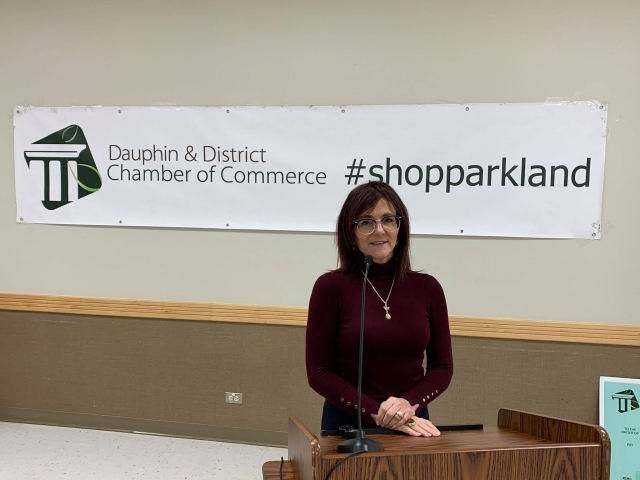 NewsNow
NewsNow
Health Canada is urging Canadians to be vigilant when buying things second-hand.
Rose Gueret, a product safety officer with Health Canada says that whether it be on a Facebook buy and sell, or during a curbside giveaway, before buying or taking something second-hand, you should think about safety.
“Some of the things people can think about, if they’re going to buy something is, ask the seller if the product has been recalled,” said Gueret. “Ask a lot of questions, do they know if there’s any history with the product? Does the product have its label on it? Do they know how the product was used? It's really good to look at the overall condition of the product.”
Canada’s consumer safety laws apply to both new and used products; so Health Canada’s campaign is aimed at making sure people get the best product possible when buying something second-hand.
Gueret says the items that cause the most issues are those that are designed for children like toys or car seats.
Gueret added that the best way to find out if someone is trying to sell a recalled item is to check Health Canada’s recall website.
- Details
- Contributed by Josh Sigurdson
The Dauphin and District Chamber of Commerce’s Lunch Series started up again today.
Stephen Chychota says it was a really great start.
“Really excited, it was great to see everybody back again, great attendance, Stephanie had an engaging presentation, so it was great to see the crowd getting involved with that, and just looking towards the rest of it because if this was any indication on the rest of the year, how that’s going to go, can’t wait to get through it all.”
Stephanie Jaddock was today’s featured speaker.
“I was talking about customer service and how communication is key to customer service and really listening to your customers. It’s not just the words spoken, it’s all the other things that are going on, like their body language, tone of voice, eye contact, that kind of stuff is really imperative when delivering a customer service experience.”
Jaddock’s topic was delivering the wow factor.
“We all expect a certain level of service from a business, but the wow factor is when that business takes it to another level for us. That, that customer walks away feeling empowered, valued, and they want to come back. How they do that is through listening to the needs of the customer and then extending beyond that and providing kindness, respect, and reaching in to see what that need is.”
Jaddock says the importance of having good relationships with the customers is that it creates loyalty, the customer will share information about the business and how they go above and beyond, and that increases profits for the business.
Before things got started, Stephen Chychota gave out a couple of checks.
“There are three groups out there that were selling Chamber Bucks for us as a fundraising opportunity and two of them were ready today to get their cheques presented to them. We gave a thousand dollar donation to Dauphin Safe Grad and to the Dauphin Clippers Hockey Team for the work that they’ve done getting those chamber bucks out there.”

The next Lunch Series date is February 11th with the topic being HR Best Practices and the Breakfast Series begins later this month on the 30th.
- Details
- Contributed by Isaac Wihak
After a second-year nursing final was found to be compromised, students and faculty at Brandon University are still looking for answers.
While it has not been determined exactly how the exam was compromised, some say that it was because students used an online practice exam containing questions on the actual final.
The president of the Brandon University Student’s Union has requested to meet with the dean of health studies to try and get to the bottom of the situation.
Nursing students were allowed to rewrite the test with a maximum possible grade of 70 percent. Students have also been allowed to appeal the school’s decision.
The school’s spokesperson says that the school may release more details regarding the compromised final, later this week.
- Details
- Contributed by Josh Sigurdson
A compensation program for survivors of Indian day schools in the country is now open for applications.
Under the settlement, survivors can apply for individual compensation for any harm caused by attending a federally run institution.
Starting in the 1920s, 200,000 Indigenous children attended over 700 Indian day schools, often suffering physical and sexual abuse.
The government expects thousands of Indigenous people across the country will be able to receive federal compensation from the settlement.
All survivors will receive a minimum of $10,000 in individual compensation, while people who endured more severe cases of abuse will be eligible for greater compensation.
The settlement that was approved by the Federal Court last summer, is also set to provide $200 million for community-based projects to support things like health and wellness programs, “truth-telling” events, and commemoration.
The funding will be administered by the McLean Day School Settlement Corp, who is currently working to develop guidelines and procedures for organizations to follow in applying for grants for projects. Those rules will be made public in the next few weeks.
Crown-Indigenous Relations Minister, Carolyn Bennett says the settlement is an important step towards healing and justice for survivors and their families.
The Indian day schools were run separately from the residential-school system. As a result, they were not included in the Indian Residential Schools Settlement Agreement approved in 2006.
- Details
- Contributed by Josh Sigurdson
Due to a string of hot and dry summers, the grasshopper population is on the rise in the province.
Provincial Entomologist John Gavloski, says that this year will be the third consecutive year of population growth.
While the population has seen an increase, Gavloski says he wouldn’t go as far as calling it an outbreak.
“It’s not at the point where we’re going to call it an outbreak or anything, but there certainly are increased levels,” said Gavloski. “If we get another hot dry year, there likely will be areas in the northwest where grasshoppers are a concern and growers may need to be managing them in some way.”
Gavloski says the western part of Manitoba will be hit the hardest with high counts of grasshoppers, particularly around Brandon, Virden, and Russell. He added the Interlake may be severely affected as well.
The province’s grasshopper forecast is based on several factors, such as counts of populations in August, weather data, and recent trends in populations.
High grasshopper populations can affect lots of crops, and result in significant damage.
Gavloski urges producers to be vigilant and check field edges and ditches early in the year, and be prepared to spray.
- Details
- Contributed by Josh Sigurdson
While it may be the dead of winter, summer is closer than you think.
Riding Mountain National Park is now taking camping reservations for this summer.
You can reserve sites in Wasagaming, Moon Lake, and Lake Audy. Otentiks, yurts, and the park’s microcube are also available for reservation.
To book your campsite, go to RMNP’s website.
- Details
- Contributed by Josh Sigurdson
Applications are now open for the Indigenous and Northern Initiatives Grant Program.
This grant program gives funding for projects and initiatives lead by indigenous and non indigenous organizations, and communities.
Projects that improve relationships between indigenous and non indigenous people in Manitoba, projects that improve the quality of life for indigenous people, particularly economic development, job creation, and educational initiatives, projects that support activities that align with the Path to Reconciliation Act, the Truth and Reconciliation Commission of Canada's Calls to Action, or the United Nations Declaration on the Rights of Indigenous Peoples, and projects that show clear, concrete and positive benefits that align with the provincial government's speech from the throne will receive priority.
The grant program is designed to support small grants up to 25 thousand dollars, but there will be consideration given to larger projects that show significant partnerships and have the potential for exceptional regional or provincial impact.
Only single year projects will be considered and the deadline to apply is February 7th.
If you'd like to apply, click here.
- Details
- Contributed by Isaac Wihak
Defence lawyers in the province have decided to suspend a planned week-long walkout, scheduled for today, after the Manitoba justice department agreed to meet with them.
150 defence attorneys were threatening the walkout over tensions over legal aid pay rates.
Private defence lawyers have not seen a raise in legal aid rates in 12 years, despite handling a majority of cases in Manitoba.
The Criminal Defence Lawyers Association of a Manitoba has planned the walkout after failing to reach an agreement with the province since May of 2018.
The meeting between the group and the province is scheduled for January 27th.
- Details
- Contributed by Josh Sigurdson
A Ukrainian film crew was in the Gilbert Plains area for a hockey-related shoot Sunday, January 12.
The crew is filming a documentary here because Ukraine has taken inspiration from Canada for its hockey program.
The video will include kids having a scrimmage while wearing hockey jerseys of players with Ukrainian descent.
This is happening in the Gilbert Plains area because when Zee ran into the producer of the documentary, they were looking for an outdoor venue to shoot the video and Zee said if anybody can pull this off it’s Gilbert Plains because there’s good volunteers and former Dauphin Kings.
The chosen venue is the Wilson River.
Former Dauphin King, Dean Murray has been making sure the ice surface is good to go and he has the directions.
“It’s three miles east of Gilbert Plains on Markham Road, then three-quarters of a mile south, then you turn left into a lane by some spruce trees before you cross the bridge.”
- Details
- Contributed by Isaac Wihak
A Western Canadian Ag project aimed at improving the taste and quality of plant-based proteins around the world has received a boost from the federal government.
The feds invested $9.5 million into the Protein Industries Supercluster, a group of Manitoba-based companies. Private donations were also given to the group, totalling $19.1 million in funds, to try and improve the protein industry in the country.
The Prime Minister’s special advisor for the Prairies, Jim Carr said: “As consumers become more and more discriminating in what they put into their tummies, this is going to move that needle significantly.”
The investment will source close to 20,000 acres worth of canola and peas grown in the Prairies, according to Merit Functional Foods, one of the companies in on the project.
They added that the money is expected to over 100,000 metric tonnes of the protein products within 5 years.
Carr said that this kind of project is a prime example of how Canada is developing the kind of products that are necessary for the rest of the world.
“This protein supercluster serves as an anchor for innovation, for job growth, and for job creation that will help Canada capture premium markets for agri-business as we truly feed the world,” said Carr. “We are letting the rest of the world know that Canada is a global leader in the plant-protein market.”
Carr added that the investment is expected to create increase the country’s GDP and create more than 50,000 jobs.
- Details
- Contributed by Josh Sigurdson
The Manitoba Agricultural Services Corporation has announced that the Hay Disaster Benefit (HDB) has been activated and associated payments will begin shortly.
Federal Ag Minister Marie-Claude Bibeau and Provincial Ag Minister Blaine Pedersen said that estimated payouts for 2019 are expected to be in excess of $5 million on approximately 1,500 claims.
“We recognize it has been a difficult harvest for many families in Manitoba,” said Bibeau. “The Hay Disaster Benefit is one of the ways our government is supporting farmers to protect their businesses against weather-related risks, such as forage shortfall.”
“The HDB is a complimentary feature of the AgriInsurance program that compensates insured forage producers for the increased cost of hay and transportation when there is a severe provincial forage shortfall,” said Pedersen. “All producers who are enrolled in the Select Hay Insurance and Basic Hay Insurance programs are automatically enrolled in the HDB.”
The Disaster Benefit was first introduced in 2014 as part of a revamped forage insurance offering. Producers first received payments in 2018.
All insured hay types (alfalfa, alfalfa grass mixtures, grasses, sweet clover and coarse hay) are eligible.
For producers to receive HDB payments, at least 20 percent of producers with Select Hay or Basic Hay Insurance must harvest less than 50 percent of their long-term average hay yield. For the 2019 crop year, producers will receive an additional $40 for each tonne below their Select Hay or Basic Hay Insurance coverage.
The benefit will not cost producers anything. The premiums are cost-shared 60 percent by the Government of Canada and 40 percent by the Province of Manitoba.
For more information on forage insurance in Manitoba contact a MASC office or visit their website.
- Details
- Contributed by Josh Sigurdson

















